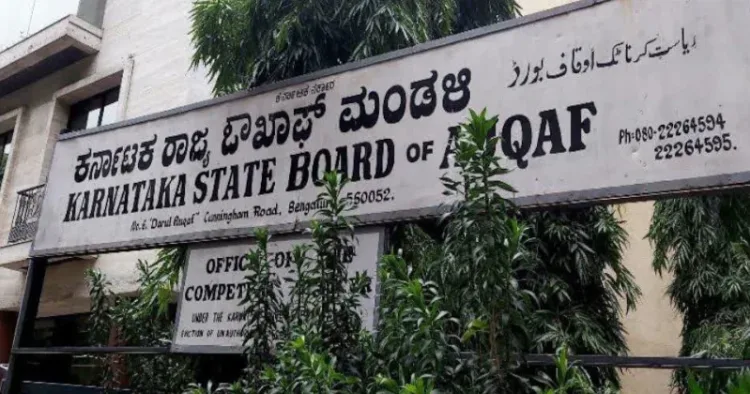The Karnataka High Court would hear the petition filed concerning the revised voter list for the Mutawalli (head of autonomous Waqf institutions) category elections to the Karnataka State Board of Waqf. Six petitioners brought the matter to the court, alleging serious procedural violations and manipulations in the voter list. Their grievance underscores concerns over the lack of transparency, favouritism, and adherence to legal guidelines in the election process.
Background of the Issue
The elections to the Karnataka State Board of Waqf, which oversees the administration of Waqf properties and institutions in the state, are an important aspect of governance for the Muslim community. The election process involves representatives from various categories, including Mutawallis, who play a crucial role as heads of autonomous Waqf institutions.
On October 15, 2024, the High Court directed the authorities to revise the voter list after earlier allegations of irregularities. However, the revised voter list, published on October 22, 2024, has become the focal point of fresh controversy. The petitioners allege that the revised list continues to flout legal mandates under the Karnataka Waqf Rules, 2017, creating a flawed foundation for the elections.
Contentions of the Petitioners
The petitioners argue that the revised list was prepared without following the required procedures. According to them, the process lacked transparency, fairness, and compliance with the rules. The key points of contention include:
- Exclusion and Inclusion Without Justification: The petitioners claim that the voter list arbitrarily excludes eligible Mutawallis while including others without proper justification. For instance, the number of voters in Bengaluru Urban district reduced drastically from 92 to 51, while Belagavi saw an unexplained rise from 16 to 59. This inconsistency has raised doubts about potential bias and favouritism in the compilation of the list.
- Failure to Publish a Preliminary Voter List: The Karnataka Waqf Rules mandate the publication of a preliminary voter list, followed by an invitation for objections. The petitioners allege that this crucial step was skipped, depriving stakeholders of an opportunity to contest the alterations. This procedural lacuna undermines the fairness and transparency of the election process.
- Broad Exclusion of Waqf Institutions: Nearly 31,000 Waqf institutions were excluded from the voter list under the criterion that only those with an annual income above ₹1 lakh would qualify. The petitioners argue that such a criterion is both unrealistic and arbitrary, leading to the disenfranchisement of many institutions.
- Hasty Election Process: The election process was initiated on the same day the revised voter list was published, with a returning officer’s appointment and the election schedule’s announcement. According to the petitioners, this simultaneous announcement raises questions about the authorities’ intent and commitment to a fair process.
Implications of the Revised Voter List
The alleged procedural flaws in the revised voter list have far-reaching implications. The petitioners contend that the entire election process is compromised based on a list that does not adhere to legal and democratic principles. They allege that the alterations favour certain influential individuals, undermining the elections’ integrity.
“The abrupt inclusion and exclusion of Mutawallis from the voter list without proper justification not only violates the Karnataka Waqf Rules but also raises serious doubts about the fairness of the entire election process,” the petition states.
Petitioners’ Demands
The petitioners have approached the Karnataka High Court with the following demands:
- Quashing of the Revised Voter List: The petitioners seek the annulment of the current voter list, alleging that it was prepared in violation of the law.
- Preparation of a Fresh Voter List: They demand the creation of a new electoral roll that complies with the Karnataka Waqf Rules, 2017, ensuring fairness and transparency.
- Stay on Election Results: An interim prayer requests the court to stay the declaration of election results, scheduled for November 19, 2024, until the matter is resolved.
- Fair Election Process: The petitioners call for a fresh, transparent election process that respects democratic principles and ensures equal representation.
Voices of the Petitioners
One of the petitioners, Riyaz, emphasized the need for judicial intervention to uphold the integrity of the elections. “We seek the Hon’ble Court’s intervention to quash the flawed voter list, ensure compliance with the law, and uphold the integrity of elections by directing the preparation of a fresh electoral roll,” he stated.
Broader Concerns
The case highlights the growing concerns about the transparency and accountability of Waqf Board elections. The Waqf Board plays a vital role in managing community resources, and any irregularities in its elections can have significant implications for the governance of Waqf institutions. The controversy also brings into focus the importance of adhering to legal procedures and ensuring inclusivity in electoral processes.
Legal and Administrative Responsibility
The High Court’s decision in this case will likely have a profound impact on how elections for the Waqf Board are conducted in the future. The petitioners’ allegations point to systemic issues that need to be addressed to restore public confidence in the administration of Waqf affairs.
The controversy also underscores the need for administrative reforms to ensure that such disputes do not arise in the future. Authorities must prioritize transparency, fairness, and inclusivity to uphold the principles of democracy and good governance.
The legal challenge to the revised voter list for the Mutawalli category elections is a critical test for the integrity of the Karnataka State Board of Waqf. As the High Court prepares to hear the case, the focus remains on ensuring that the elections are conducted in a manner that is fair, transparent, and compliant with the law. The outcome of this case will not only determine the immediate future of the Waqf Board elections but also set a precedent for the governance of Waqf institutions in Karnataka.



















Comments